比较级和最高级单词汇总
小学英语必背比较级和最高级
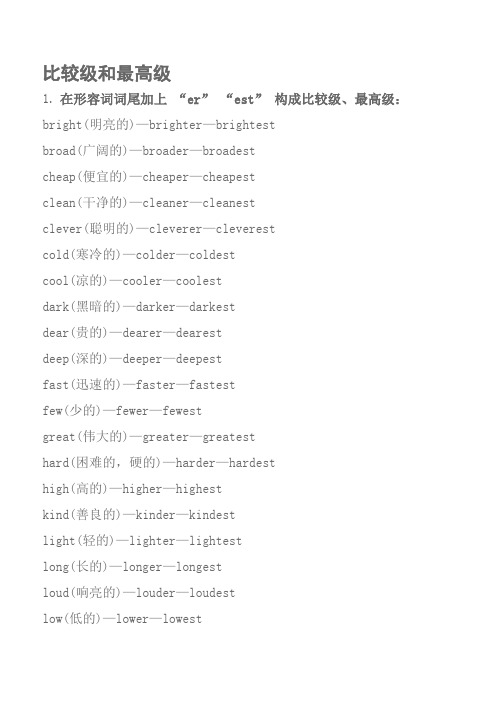
比较级和最高级1.在形容词词尾加上“er”“est”构成比较级、最高级:bright(明亮的)—brighter—brightestbroad(广阔的)—broader—broadestcheap(便宜的)—cheaper—cheapestclean(干净的)—cleaner—cleanestclever(聪明的)—cleverer—cleverestcold(寒冷的)—colder—coldestcool(凉的)—cooler—coolestdark(黑暗的)—darker—darkestdear(贵的)—dearer—dearestdeep(深的)—deeper—deepestfast(迅速的)—faster—fastestfew(少的)—fewer—fewestgreat(伟大的)—greater—greatesthard(困难的,硬的)—harder—hardesthigh(高的)—higher—highestkind(善良的)—kinder—kindestlight(轻的)—lighter—lightestlong(长的)—longer—longestloud(响亮的)—louder—loudestlow(低的)—lower—lowestnew(新的)—newer—newestpoor(穷的)—poorer—poorestquick(快的)—quicker—quickestquiet(安静的)—quieter—quietestrich(富裕的)—richer—richestshort(短的)—shorter—shortestslow(慢的)—slower—slowestsmall(小的)—smaller—smallestsmart(聪明的)—smarter—smartestsoft(柔软的)—softer—softeststrong(强壮的)—stronger—strongestsweet(甜的)—sweeter—sweetesttall(高的)-taller-tallestthick(厚的)—thicker—thickestwarm(温暖的)—warmer—warmestweak(弱的)—weaker—weakestyoung(年轻的)—younger—youngest2.双写最后一个字母,再加上“er”“est”构成比较级、最高级:big(大的)—bigger—biggestfat(胖的)—fatter—fattesthot(热的)—hotter—hottestsad(伤心的)—sadder—saddestthin(瘦的)—thinner—thinnestwet(湿的)—wetter—wettestmad(疯的)—madder—maddest3.以不发音的字母e结尾的形容词,加上“r”“st”构成比较级、最高级:able(能干的)—abler—ablestbrave(勇敢的)—braver—bravestclose(接近的)—closer—closestfine(好的,完美的)—finer—finestlarge(巨大的)—larger—largestlate(迟的)—later—latestnice(好的)—nicer—nicestripe(成熟的)—riper—ripestrude(粗鲁的)—ruder—rudestsafe(安全的)—safer—safeststrange(奇怪的)—stranger—strangestwide(宽广的)—wider—widest wise(睿智的,聪明的)—wiser—wisest white(白的)—whiter—whitest4.以字母y结尾的形容词,把y改为i,再加上“er”“est”构成比较级、最高级:busy(忙碌的)—busier—busiestdirty(脏的)—dirtier—dirtiestdry(干燥的)—drier—driestearly(早的)—earlier—earliesteasy(容易的)—easier—easiestfriendly(友好的)—friendlier—friendliest fun—funnier—funniesthappy(开心的)—happier—happiesthealthy(健康的)—healthier—healthiestheavy(重的)—heavier—heaviesthungry(饿的)—hungrier—hungriestlazy(懒惰的)—lazier—laziestlucky(幸运的)—luckier—luckiestnaughty(调皮的)—naughtier—naughtiestnoisy(嘈杂的)—noisier—noisiestpretty(美丽的)—prettier—prettiestsilly(傻的)—sillier—silliestspicy(辣的)—spicier—spiciestthirsty(渴的)—thirstier—thirstiestugly(丑的)—uglier—ugliest5.双音节、多音节形容词,在单词前面加上“more”“most”构成比较级、最高级:afraid(害怕的)—more afraid—most afraidbeautiful(美丽的)—more beautiful—most beautifulcareful(仔细的)—more careful—most carefulcheerful(开心的)—more cheerful—most cheerfulcrowded(拥挤的)—more crowded—most crowdeddangerous(危险的)—more dangerous—most dangerousdelicious(美味的)—more delicious—most deliciousdifficult(困难的)—more difficult—most difficultexciting(令人兴奋的)—more exciting—most exciting expensive(昂贵的)—more expensive—most expensivefamous(著名的)—more famous—most famoushard-working(勤奋的)—more hard-working—most hard-working helpful(有帮助的)—more helpful—most helpfulhonest(诚实的)—more honest—most honestimportant(重要的)—more important—most importantinteresting(有趣的)—more interesting—most interesting polite(有礼貌的)—more polite—most politeterrible(可怕的)—more terrible—most terribletired(累的)—more tired—most tired6.不规则变化的形容词:bad(坏的)—worse—worstfar(远的)—farther—farthest (far—further—furthest)good(形容词好的)—better—bestwell(副词好的,身体好的)—better—bestill(病的)—worse—worstlittle(少的)—less—leastmany(形容可数多的)—more—mostmuch(形容不可数多的)—more—mostold(年老的)—older—oldest ( old—elder—eldest)。
初中比较级和最高级的单词表

初中比较级和最高级的单词表比较级和最高级的练表形容词可以通过在词尾添加“er”和“est”来构成比较级和最高级。
以下是一些常见的例子:明亮的 - bright - brighter - brightest广阔的 - broad - broader - broadest便宜的 - cheap - cheaper - cheapest干净的 - clean - cleaner - cleanest聪明的 - clever - cleverer - cleverest寒冷的 - cold - colder - coldest凉的 - cool - cooler - coolest黑暗的 - dark - darker - darkest贵的 - dear - dearer - dearest深的 - deep - deeper - deepest迅速的 - fast - faster - fastest少的 - few - fewer - fewest低的 - low - lower - lowest近的 - near - nearer - nearest新的 - new - newer - newest穷的 - poor - poorer - poorest快的 - quick - quicker - quickest安静的 - quiet - quieter - quietest富裕的 - rich - richer - richest短的 - short - shorter - shortest慢的 - slow - slower - slowest小的 - small - smaller - smallest聪明的 - smart - smarter - smartest柔软的 - soft - softer - softest伟大的 - great - greater - greatest强壮的 - strong - stronger - strongest困难的/硬的 - hard - harder - hardest甜的 - sweet - sweeter - sweetest高的 - high - higher - highest高的 - tall - taller - tallestKindness is one of the kindest qualities a person can possess。
小学英语必背比较级和最高级

小学英语必背比较级和最高级-CAL-FENGHAI.-(YICAI)-Company One1比较级和最高级1.在形容词词尾加上“er”“est”构成比较级、最高级:bright(明亮的)—brighter—brightestbroad(广阔的)—broader—broadestcheap(便宜的)—cheaper—cheapestclean(干净的)—cleaner—cleanestclever(聪明的)—cleverer—cleverestcold(寒冷的)—colder—coldestcool(凉的)—cooler—coolestdark(黑暗的)—darker—darkestdear(贵的)—dearer—dearestdeep(深的)—deeper—deepestfast(迅速的)—faster—fastestfew(少的)—fewer—fewestgreat(伟大的)—greater—greatesthard(困难的,硬的)—harder—hardesthigh(高的)—higher—highestkind(善良的)—kinder—kindestlight(轻的)—lighter—lightestlong(长的)—longer—longestloud(响亮的)—louder—loudestlow(低的)—lower—lowestnear(近的)—nearer—nearestnew(新的)—newer—newestpoor(穷的)—poorer—poorestquick(快的)—quicker—quickestquiet(安静的)—quieter—quietestrich(富裕的)—richer—richestshort(短的)—shorter—shortestslow(慢的)—slower—slowestsmall(小的)—smaller—smallestsmart(聪明的)—smarter—smartestsoft(柔软的)—softer—softeststrong(强壮的)—stronger—strongestsweet(甜的)—sweeter—sweetesttall(高的)-taller-tallestthick(厚的)—thicker—thickestwarm(温暖的)—warmer—warmestweak(弱的)—weaker—weakestyoung(年轻的)—younger—youngest2.双写最后一个字母,再加上“er”“est”构成比较级、最高级:big(大的)—bigger—biggestfat(胖的)—fatter—fattesthot(热的)—hotter—hottestred(红的)—redder—reddestsad(伤心的)—sadder—saddestthin(瘦的)—thinner—thinnestwet(湿的)—wetter—wettestmad(疯的)—madder—maddest3.以不发音的字母e结尾的形容词,加上“r”“st”构成比较级、最高级:able(能干的)—abler—ablestbrave(勇敢的)—braver—bravestclose(接近的)—closer—closestfine(好的,完美的)—finer—finestlarge(巨大的)—larger—largestlate(迟的)—later—latestnice(好的)—nicer—nicestripe(成熟的)—riper—ripestrude(粗鲁的)—ruder—rudestsafe(安全的)—safer—safeststrange(奇怪的)—stranger—strangestwide(宽广的)—wider—widest wise(睿智的,聪明的)—wiser—wisest white(白的)—whiter—whitest4.以字母y结尾的形容词,把y改为i,再加上“er”“est”构成比较级、最高级:busy(忙碌的)—busier—busiestdirty(脏的)—dirtier—dirtiestdry(干燥的)—drier—driestearly(早的)—earlier—earliesteasy(容易的)—easier—easiestfriendly(友好的)—friendlier—friendliestfun—funnier—funniesthappy(开心的)—happier—happiesthealthy(健康的)—healthier—healthiestheavy(重的)—heavier—heaviesthungry(饿的)—hungrier—hungriestlazy(懒惰的)—lazier—laziestlucky(幸运的)—luckier—luckiestnaughty(调皮的)—naughtier—naughtiestnoisy(嘈杂的)—noisier—noisiestpretty(美丽的)—prettier—prettiestsilly(傻的)—sillier—silliestspicy(辣的)—spicier—spiciestthirsty(渴的)—thirstier—thirstiestugly(丑的)—uglier—ugliest5.双音节、多音节形容词,在单词前面加上“more”“most”构成比较级、最高级:afraid(害怕的)—more afraid—most afraidbeautiful(美丽的)—more beautiful—most beautifulcareful(仔细的)—more careful—most carefulcheerful(开心的)—more cheerful—most cheerfulcrowded(拥挤的)—more crowded—most crowdeddangerous(危险的)—more dangerous—most dangerousdelicious(美味的)—more delicious—most deliciousdifficult(困难的)—more difficult—most difficultexciting(令人兴奋的)—more exciting—most excitingexpensive(昂贵的)—more expensive—most expensivefamous(著名的)—more famous—most famoushard-working(勤奋的)—more hard-working—most hard-working helpful(有帮助的)—more helpful—most helpfulhonest(诚实的)—more honest—most honestimportant(重要的)—more important—most importantinteresting(有趣的)—more interesting—most interestingpolite(有礼貌的)—more polite—most politeterrible(可怕的)—more terrible—most terribletired(累的)—more tired—most tired6.不规则变化的形容词:bad(坏的)—worse—worstfar(远的)—farther—farthest (far—further—furthest)good(形容词好的)—better—bestwell(副词好的,身体好的)—better—bestill(病的)—worse—worstlittle(少的)—less—leastmany(形容可数多的)—more—mostmuch(形容不可数多的)—more—mostold(年老的)—older—oldest ( old—elder—eldest)。
形容词比较级和最高级单词表
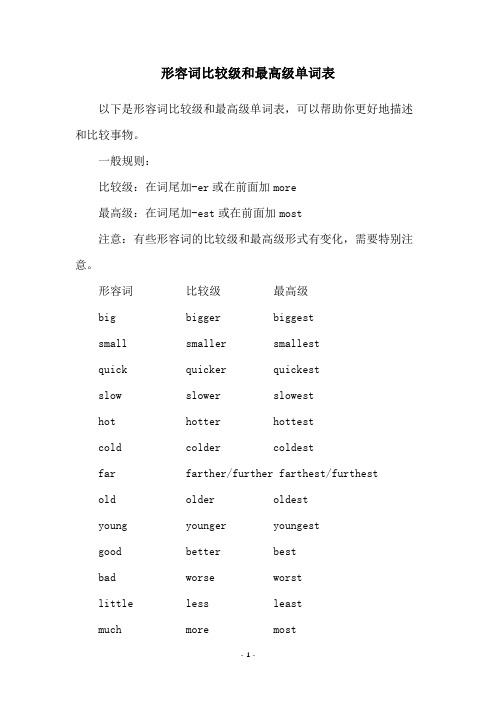
形容词比较级和最高级单词表以下是形容词比较级和最高级单词表,可以帮助你更好地描述和比较事物。
一般规则:比较级:在词尾加-er或在前面加more最高级:在词尾加-est或在前面加most注意:有些形容词的比较级和最高级形式有变化,需要特别注意。
形容词比较级最高级big bigger biggestsmall smaller smallestquick quicker quickestslow slower slowesthot hotter hottestcold colder coldestfar farther/further farthest/furthestold older oldestyoung younger youngestgood better bestbad worse worstlittle less leastmuch more mostmany more mostfew fewer fewestnear nearer nearestlate later latest/lastearly earlier earliest/first 此外,还有一些特定形容词的比较级和最高级形式需要牢记:形容词比较级最高级good-looking better-looking best-lookingbad-tempered worse-tempered worst-temperedwell-behaved better-behaved best-behavedwell-known better-known best-knownmuch/many more mostlittle less leastfar farther/further farthest/furthestold elder eldestyoung junior juniormostold-fashioned more old-fashioned most old-fashioned pretty prettier prettiestugly uglier ugliestheavy heavier heaviestlight lighter lightestthick thicker thickestthin thinner thinnestlong longer longestshort shorter shortest以上就是形容词比较级和最高级单词表,希望能对你的英语学习有所帮助。
(完整版)高中英语的比较级和最高级用法总结

比较级和最高级1.在形容词词尾加上“er” “est” 构成比较级、最高级:bright(明亮的)—brighter—brightest broad(广阔的)—broader—broadest cheap(便宜的)-cheaper—cheapest clean(干净的)—cleaner—cleanest clever(聪明的)—cleverer—cleverest cold(寒冷的)-colder—coldest cool(凉的)—cooler—coolest dark(黑暗的)—darker—darkestdear(贵的)—dearer—dearest deep(深的)—deeper—deepestfast(迅速的)—faster-fastest few(少的)—fewer-fewestgreat(伟大的)-greater-greatest hard(困难的,硬的)—harder—hardest high(高的)-higher—highest kind(善良的)—kinder-kindestlight(轻的)—lighter—lightest long(长的)—longer—longestloud(响亮的)—louder—loudest low(低的)—lower—lowestnear(近的)—nearer—nearest new(新的)—newer-newestpoor(穷的)—poorer—poorest quick(快的)—quicker—quickestquiet(安静的)—quieter—quietest rich(富裕的)—richer—richest short(短的)—shorter—shortest slow(慢的)-slower-slowestsmall(小的)—smaller-smallest smart(聪明的)—smarter—smartestsoft(柔软的)—softer—softest strong(强壮的)-stronger-strongest sweet(甜的)—sweeter—sweetest tall(高的)-taller-tallestthick(厚的)-thicker—thickest warm(温暖的)—warmer—warmestweak(弱的)—weaker—weakest young(年轻的)-younger-youngest2。
常见的比较级和最高级单词表
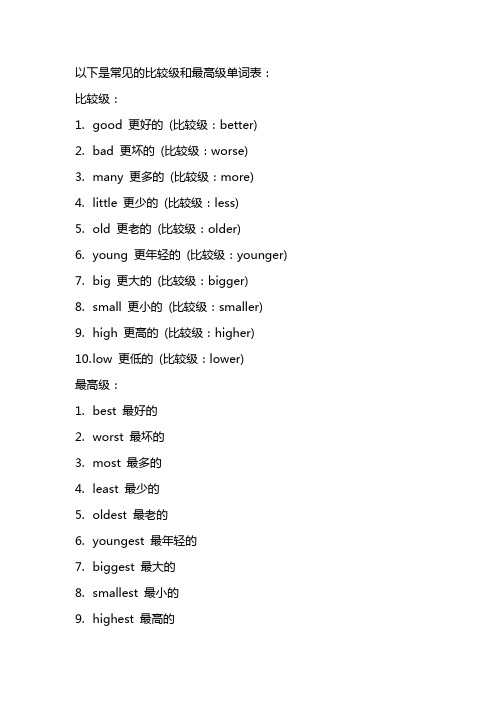
以下是常见的比较级和最高级单词表:
比较级:
1.good 更好的(比较级:better)
2.bad 更坏的(比较级:worse)
3.many 更多的(比较级:more)
4.little 更少的(比较级:less)
5.old 更老的(比较级:older)
6.young 更年轻的(比较级:younger)
7.big 更大的(比较级:bigger)
8.small 更小的(比较级:smaller)
9.high 更高的(比较级:higher)
10.low 更低的(比较级:lower)
最高级:
1.best 最好的
2.worst 最坏的
3.most 最多的
4.least 最少的
5.oldest 最老的
6.youngest 最年轻的
7.biggest 最大的
8.smallest 最小的
9.highest 最高的
10.lowest 最低的
需要注意的是,这些是比较常见的例子,实际上英语中还有很多其他的比较级和最高级形式。
(完整版)比较级和最高级列表
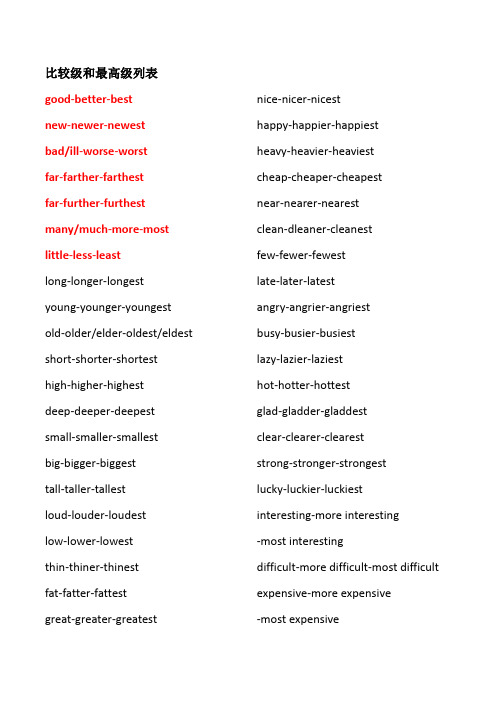
比较级和最高级列表good-better-bestnew-newer-newestbad/ill-worse-worstfar-farther-farthestfar-further-furthestmany/much-more-most little-less-leastlong-longer-longestyoung-younger-youngest old-older/elder-oldest/eldest short-shorter-shortesthigh-higher-highestdeep-deeper-deepestsmall-smaller-smallestbig-bigger-biggesttall-taller-tallestloud-louder-loudestlow-lower-lowestthin-thiner-thinestfat-fatter-fattestgreat-greater-greatest nice-nicer-nicesthappy-happier-happiestheavy-heavier-heaviestcheap-cheaper-cheapestnear-nearer-nearestclean-dleaner-cleanestfew-fewer-fewestlate-later-latestangry-angrier-angriestbusy-busier-busiestlazy-lazier-laziesthot-hotter-hottestglad-gladder-gladdestclear-clearer-cleareststrong-stronger-strongestlucky-luckier-luckiestinteresting-more interesting-most interestingdifficult-more difficult-most difficult expensive-more expensive-most expensive形容词比较级、最高级的构成一、规则变化1. 单音节词和少数双音节词(1)一般情况在原级词尾加-er构成比较级,加-est构成最高级。
比较级常用单词总结
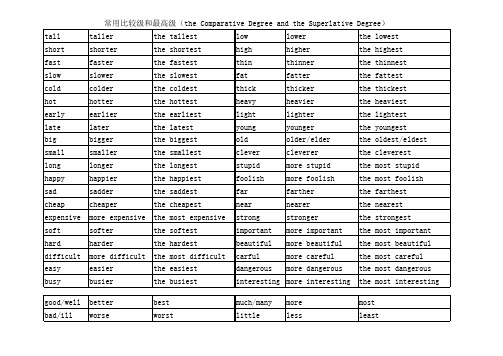
特殊比较级和最高级的单词
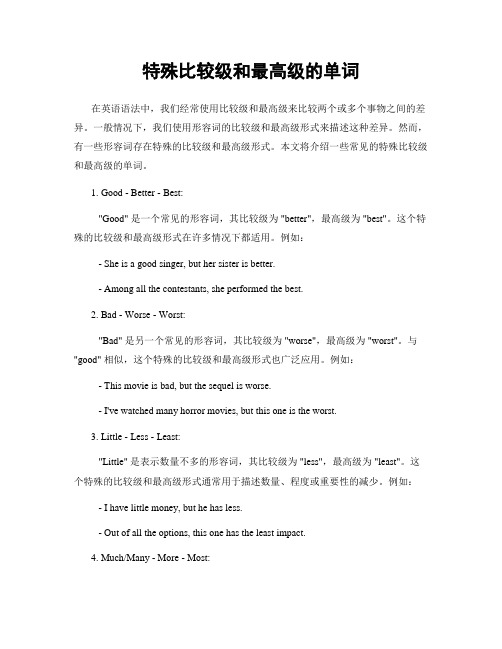
特殊比较级和最高级的单词在英语语法中,我们经常使用比较级和最高级来比较两个或多个事物之间的差异。
一般情况下,我们使用形容词的比较级和最高级形式来描述这种差异。
然而,有一些形容词存在特殊的比较级和最高级形式。
本文将介绍一些常见的特殊比较级和最高级的单词。
1. Good - Better - Best:"Good" 是一个常见的形容词,其比较级为 "better",最高级为 "best"。
这个特殊的比较级和最高级形式在许多情况下都适用。
例如:- She is a good singer, but her sister is better.- Among all the contestants, she performed the best.2. Bad - Worse - Worst:"Bad" 是另一个常见的形容词,其比较级为 "worse",最高级为 "worst"。
与"good" 相似,这个特殊的比较级和最高级形式也广泛应用。
例如: - This movie is bad, but the sequel is worse.- I've watched many horror movies, but this one is the worst.3. Little - Less - Least:"Little" 是表示数量不多的形容词,其比较级为 "less",最高级为 "least"。
这个特殊的比较级和最高级形式通常用于描述数量、程度或重要性的减少。
例如: - I have little money, but he has less.- Out of all the options, this one has the least impact.4. Much/Many - More - Most:"Much" 用于不可数名词,"many" 用于可数名词。
好的原级和比较级和最高级英语

好的原级和比较级和最高级英语以下是20个包含原级、比较级和最高级的单词及其相关内容:1. big(大的)- 英语释义:large in size, extent, or capacity.- 短语:big city(大城市);big house(大房子)- 用法:可作形容词修饰名词。
- 原级:big。
例如:This is a big apple.(这是一个大苹果。
)- 比较级:bigger。
例如:His house is bigger than mine.(他的房子比我的大。
)- 最高级:biggest。
例如:This is the biggest supermarket in the city.(这是这个城市最大的超市。
)2. small(小的)- 英语释义:not large in size, number, amount, etc.- 短语:small town(小镇);small change(零钱)- 用法:形容词,用来描述事物的规模等。
- 原级:small。
例如:She has a small dog.(她有一只小狗。
)- 比较级:smaller。
例如:This box is smaller than that one.(这个盒子比那个小。
)- 最高级:smallest。
例如:The smallest flower is very beautiful.(最小的那朵花非常漂亮。
)3. tall(高的)- 英语释义:having a relatively great height.- 短语:tall building(高楼);tall tree(高大的树)- 用法:修饰人或物的高度。
- 原级:tall。
例如:He is a tall boy.(他是一个高个子男孩。
)- 比较级:taller。
例如:My sister is taller than me.(我姐姐比我高。
)- 最高级:tallest。
常用比较级最高级归纳
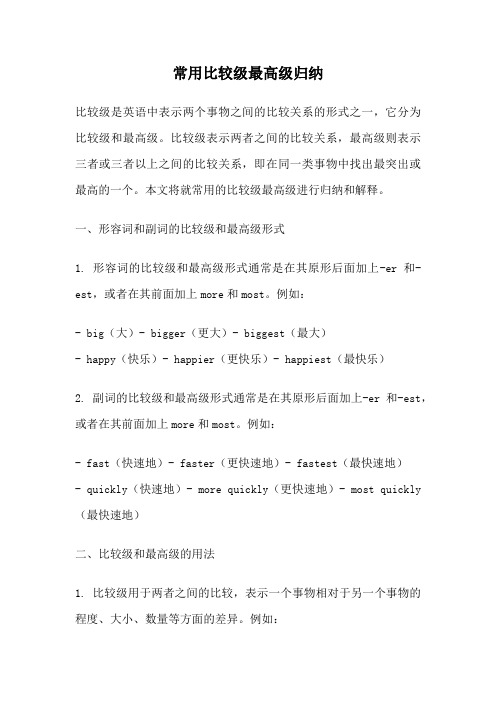
常用比较级最高级归纳比较级是英语中表示两个事物之间的比较关系的形式之一,它分为比较级和最高级。
比较级表示两者之间的比较关系,最高级则表示三者或三者以上之间的比较关系,即在同一类事物中找出最突出或最高的一个。
本文将就常用的比较级最高级进行归纳和解释。
一、形容词和副词的比较级和最高级形式1. 形容词的比较级和最高级形式通常是在其原形后面加上-er和-est,或者在其前面加上more和most。
例如:- big(大)- bigger(更大)- biggest(最大)- happy(快乐)- happier(更快乐)- happiest(最快乐)2. 副词的比较级和最高级形式通常是在其原形后面加上-er和-est,或者在其前面加上more和most。
例如:- fast(快速地)- faster(更快速地)- fastest(最快速地)- quickly(快速地)- more quickly(更快速地)- most quickly (最快速地)二、比较级和最高级的用法1. 比较级用于两者之间的比较,表示一个事物相对于另一个事物的程度、大小、数量等方面的差异。
例如:- The weather is colder today than yesterday.(今天的天气比昨天冷。
)- He is taller than his brother.(他比他的哥哥高。
)2. 最高级用于三者或三者以上的比较,表示在同一类事物中找出最突出或最高的一个。
例如:- This is the tallest building in the city.(这是城里最高的建筑。
)- She is the most beautiful girl in our class.(她是我们班最漂亮的女孩。
)三、比较级和最高级的特殊形式1. 比较级和最高级的特殊形式可以通过在形容词或副词前面加上more和most来表示。
例如:- more expensive(更贵的)- most difficult(最困难的)2. 有些形容词和副词的比较级和最高级形式是不规则的,需要进行记忆。
比较级最高级总结归纳
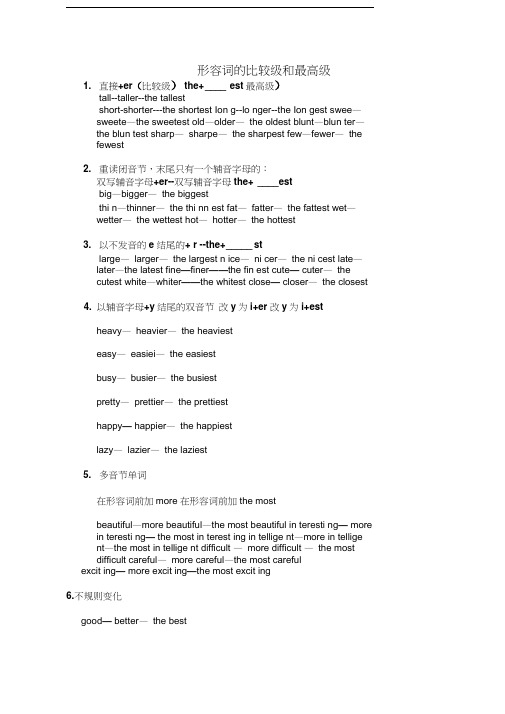
形容词的比较级和最高级1. 直接+er(比较级) the+ ____ est最高级)tall--taller--the tallestshort-shorter---the shortest Ion g--lo nger--the Ion gest swee—sweete—the sweetest old—older—the oldest blunt—blun ter—the blun test sharp—sharpe—the sharpest few—fewer—thefewest2. 重读闭音节,末尾只有一个辅音字母的:双写辅音字母+er--双写辅音字母the+ ____ e stbig—bigger—the biggestthi n—thinner—the thi nn est fat—fatter—the fattest wet—wetter—the wettest hot—hotter—the hottest3. 以不发音的e结尾的+ r --the+ _____ stlarge—larger—the largest n ice—ni cer—the ni cest late—later—the latest fine—finer——the fin est cute— cuter—thecutest white—whiter——the whitest close— closer—the closest4. 以辅音字母+y结尾的双音节改y为i+er 改y为i+estheavy—heavier—the heaviesteasy—easiei—the easiestbusy—busier—the busiestpretty—prettier—the prettiesthappy— happier—the happiestlazy—lazier—the laziest5. 多音节单词在形容词前加more 在形容词前加the mostbeautiful—more beautiful—the most beautiful in teresti ng— more in teresti ng— the most in terest ing in tellige nt—more in telligent—the most in tellige nt difficult —more difficult —the mostdifficult careful—more careful—the most carefulexcit ing— more excit ing—the most excit ing6.不规则变化good— better—the bestbad— worse—the worstmany/much— more—the mostlittle —less— the leastfar(远的)一farther—the farthest句型结构:主语+ be动词+形容词的比较级+ than+宾语I am taller tha n Li ngli ng.Jim is fatter tha n Peter.This dress is prettier tha n that one.This questi on is more difficult tha n that one.This car is better tha n that one。
特殊的比较级和最高级归纳常用的

特别的比较级和最高等归纳经常应用的:bad(坏的)—worse—worstfar(远的)—farther—farthest (far—further—furthest)good/well(好的)—better—bestill(病的)—worse—worstlittle(少的)—less—leastmany(多的)—more—mostmuch(多的)—more—most形容词比较级最高等out utter uttermostup upper uppermostin inner innermostfore further furthestnigh nigher nighestfar farther farthestold elder eldestlate later latestmany more most( number )little less leastmuch more most( quantity )bad, evil, , ill worse worstwell, good better best学英语单词的比较级和最高等归纳.例talltallertallestlonglongerlongest例nicenicernicest3.子音字母+y结尾词y变i再加er或est例heavyheavierheaviest例bigbiggerbiggest例slowlymore slowlymost slowly;beautifulmore beautifulmost beautiful小学英语语法形容词的比较级温习比较级比较级:一.形容词的比较级 1.形容词比较级在句子中的应用:两个事物某人的比较用比较级,比较级后面一般带有单词than.比较级的句子构造平日是:什么 + 动词be (am , is , are ) + 形容词比较级 + than(比)+ 什么 ,如:I'm taller and heavier than you. (我比你更高和更重.)An elephant is bigger than a tiger. (一只大象比一只山君更大.)比较级前面可以用more, a little 来润饰暗示程度.than后的人称代词用主格(白话中可用宾格). 2.形容词加er的规矩:① 一般的直接在词尾加er ,如tall taller , strong stronger ,② 以e结尾的,直接加r ,如fine finer ,③ 以子音字母加y结尾的,先改y为i再加er,如funny funnier④以一个元音字母和一个子音字母结尾,双写最后的字母再加er,如bigbigger, thinthinner ,hot–hotter, sadsadder,fat—fatter3.不规矩形容词比较级: goodbetter, beautifulmore beautiful, expensivemore expensive 二.副词的比较级1.形容词与副词的差别 (有be用形,有形用be;有动用副,有副用动) ⑴在句子中形容词一般处于名词之前或be动词之后. ⑵副词在句子中最罕有的是处于实义动词之后.2.副词比较级的变更规矩根本与形容词比较级雷同☆留意☆ 1.比较的两者应当是互相对应的可比较的器械.典范错误:My hair is longer than you.(我的头发比你更长.)比较的两者是我的头发.你(整小我),那么比较的对象就没有可比性.应当改为:My hair is longer than yours. 或My hair is longer than your hair.2.假如比较的两者是一样的时刻,我们会用as…as…这个词组.它的用法是:什么+be+as+形容词本相+as+什么,意思是什么和什么一样…….如:I'm as tall as you.(我和你一样高.)My feet are as big as yours.(我的脚和你的一样大.)最高等:一.形容词的最高等变更相似于比较级,只是把词尾的er 改成est,如:tall (本相) taller (比较级)long(本相)longer(比较级)big (本相) bigger(比较级)二、除此之外,还有几个特别的单词,它的比较级和最高等都是不规矩.三、如:many / much(本相) more(比较级) most(最高等)little / few(本相) less (比较级) least(最高等)good(本相) better(比较级) best(最高等)bad (本相) worse(比较级) worst(最高等)far (本相) further furthest演习:一.写出下列形容词或副词的比较级old__________ young________ tall_______ long________ short________ strong________ big________ small_______fat_________ thin__________ heavy______ light________nice_________ good_________ beautiful__________________low__________ high_________ slow_______ fast________late__________ early_________ far_________ well_______二.依据句意填入单词的准确情势:1. My brother is two years __________(old)than me.2. Tomis as ________(fat) as Jim.3. Is your sister __________(young) than you? Yes,she is.4. Who is ___________(thin),you or Helen? Helen is.5. Whose pencilbox is __________(big),yours or hers? Hers is.6. Mary’s hair is as __________(long) as Lucy’s.7.Ben ______ (jump) ________ (high) than some of the boys in his class. 8.________ Nancy sing __________ (well) than Helen? Yes, she _____. 9.Fangfang is not as _________(tall) as the other girls. 10.My eyes are __________(big) than ________ (she).. 11.Which is ___________(heavy),the elephant or the pig? 12.Who gets up _________(early),Tim or Tom? 13._____the girls get up_______(early) than the boys?No,they______.14. Jim runs _____(slow). But Ben runs _____(slow).15.The child doesn’t______(write) a s ____(fast) as the students.三.翻译句子: 1.谁比Jim年事大?是你.________ is _________than Jim? ________ are2.谁比David更强健?是Gao Shan.________ _________ than David? Gao Shan ________.3.谁的铅笔更长,他的照样她的?我想是她的._________ pencil is _________,______or________?________is,I think.4.谁的苹果更重,你的姐姐的照样你的弟弟的?我的弟弟的._________ apples ________ ________,your _______ or your _______?My ____________ ___________.5.你和你的叔叔一样高吗?是的._________ ________as _________as your uncle?Yes,I am.6.他和他的同伙Jim一样年青.He _______ as __________ as ________ ________ Jim.7.她和她的双胞胎哥哥一样胖吗?不,她比他瘦.________ ________ as _________ as______ twin _______? No, _________ _________ than him.8.Yang Ling天天睡得比SuYang晚. Yang Ling ________ to _______ ________ than Su Yang every day. 9.我跳得和Mike一样远. I _________ as _______ as Mike. 10.Tom比你跑得快吗?不是的,他和我跑得一样快. ____ Tom _____ _____ than you?No,he _______. He_____ as_____ as_____.11.多做活动,你会更强健. ________ more exercise,you’ll ________ _________ soon. 12.我的科学很好,但是语文不好. I ______ ________ at Science.But I don’t _________ well in Chinese. 13. 你放风筝比王兵放得高吗?不,我比他放得低.____you_______the kite_____than Wang bing?No,I______it _____than___.14.我爱好泅水.我所有的同伙都游得比我慢. I like_______.All my______ _______ _______than me.15.我的姐姐起得比我早.My_____ _____ up _____than me.16.女孩比男孩唱得好吗?是的.____the girls______ ______ ______the boys? Yes,they ____.17.她不善于体育.但我跳得没有她高.She doesn’t __ __ ___ __ in PE. But I don’t ___ ___ ___ __than __ ___.18.你足球踢得比你的同班同窗好吗?不,他们踢得和我一样好.__ _ you __ __football ___ __than your classmates? No, they__ __as _ _ _as me.19.我母亲比我父亲年事小.My_____ _____ ______than my ______.20.她的毛衣和我的一样重._____sweater_____ as_______as_____. 21.我的连衣裙太短了.我想买一条大点的.My dress_____ too_____. I want to ___ __a___ ___one.22. I'm taller than Mike .(该成用原级的比较)I'm _________ as ________ asMike .小学英语词汇:形容词.副词及比较级级 0522 13:53第1页 /(共5页)一.形容词的润饰与地位一般来说,从构词法角度来看,后缀“ly”往往是副词,但有的以“ly'结尾的词是形容词而不是副词,这点要留意;形容词一般可以在句子中做定语,表语等成份,但有些形容词在句子中只能做表语和只能做前置定语;这些形容词在润饰时刻有必定的特别性要引起大家的留意,下面做了一下归纳:1 以ly结尾的是形容词而不是副词:costly 昂贵的 lonely 孤单的deadly 逝世一般的 lively 生动的friendly 友爱的 silly 傻气的kindly 热情肠的 likely 可能的leisurely 安闲的 ugly 长得丑的brotherly 兄弟般的 monthly 每月的earthly 尘凡的2 只作以“a”开首的许多形容词只能做表语:afraid 畏惧的 alike 相象的awake 醒着的 alone 单独的,惟一的alive 在世的 ashamed 羞愧的asleep 睡着的 aware 意识到的.觉察到的well 健康的 content 满足的unable 无能的3 只作前置定语的形容词earthen 土壤做的,大地的 daily 每日的 latter 后面的golden 金子般的 weekly 每周的 inner 里面的silken 丝一般的 monthly 每月的 outer 外面的wooden 木制的 yearly 每年的 elder 年长的woolen 毛织的 former 前任的 mere 仅,只不过only 惟一的 sheer 纯粹的 very 正好的little 小的 live 活的4.下列动词既是实义动词又是系动词,留意用做系动词时,请求形容词做表语:remain keep become, get, grow, go, come, turn, stay, stand, run, prove, seem, appear, look.如:All those left undone may sound great in theory, but even the truest believer has great difficulty when it comes to specifics.二.形容词与副词的比较级与级1. 考比较级时,考生应掌控:1)形容词和副词比较级的情势是否和比较连词对应消失,等于否相符原级比较及比较级的构造.如:Do you enjoy listening to records? I find records are often , or better than an actual performance.[A]as good as [B]as good [C]good [D]good as在这里as good as 比较连词与better than比较连词同时消失时刻,不克不及省略任何一个介词.答案为AOn the whole, ambitious students are more likely to succeed in their studies than are those with little ambition.2)比较的成分是否属于同类事物或同类概念,既是说比较要具有可比性.如:The number of registered participants in this year's marathon was half .[A] of last year's [B]those of last year's[C]of those of last year [D] that of last year's(前后比拟的应当是本年和客岁注册介入的人数“the number of”故代替它的应当是单数指导代词“that”,而不克不及选择B,those是指代participants,不是同类对第2页 /(共5页)比较,答案为D.Young readers, more often than not, find the novels of dickens far more exciting than Thackeray's.3)比较级与倍数词关系及其地位原级构造中可拔出表达倍数的词,暗示为“为….若干倍”,当与有暗示倍数比较的词在一路时刻等,他们的地位是,倍数词+as…as…,或倍数词+more…than…,但again一般放在原级词之后,即“as+原级+again+as”.如:Smoking is so harmful to personal health that it kills people each year than automobile accidents.[A] seven more times [B] seven times more[C] over seven times [D] seven times(答案为B)“Do you regret paying five hundred dollars for the painting?”“No, I would gladly have paid for it.”[A] twice so much [B] twice as much[C] as much twice [D] so much twice(答案为B)My uncle is as old again as I am4)下列词和短语不必比较级情势却暗示比较概念:inferior, minor, senior, prior, prefer to, superior, major, junior, preferable, differ from, compared with, in comparison with, different from, rather than. 如:Their watch is to all the other watches on the market. [A] superior [B] advantageous [C] super [D] beneficial (答案为A)Prior to his departure, he addressed a letter to his daughter. (1986年考研题)5)“比较级+and +比较级”或“more and more/less and less +原级”以及“ever, steadily, daily等副词+比较级”构造暗示“越来越……”的意思,与这类构造搭配的经常应用动词有grow, get ,become等.前面两种情形更多地出如今进行时态中,留意的是这三种情形引诱的比较级后面都不须要用than.如:Things are getting worse and worse.As I spoke to him he became less and less angry.Her health was becoming daily worseThe road got ever worse until there was no road at all = the road got worse and worse.6)比较级前面可以用even, still, yet ,all the (more)等润饰语用以增强语气,暗示“加倍”的意思.如Today it is even colder than yesterdayI have yet more exciting news for you7)有关比较级的特别句型:A):not so much…as…与其说……不如说……The chief reason for the population growth isn't so much a rise in birth rates a fall in death rates as a result of improvements in medical care.第3页 /(共5页)[A] and [B] as [C]but [D] or生齿增加的重要原因与其说是因为出生率的进步,还不如说是因为医疗的进步带来的逝世亡率降低的成果.答案为BB) no/not any more…than…两者一样都不……The heart is intelligent than the stomach, for they are both controlled by the brain.[A] not so [B]not much [C]much more [D] no more(心脏和胃两者都不具有智力,他们都受大脑掌握.答案为D)There is no reason they should limit how much vitamin you take, they can limit how much water you drink.[A] much more than [B] no more than[C] no less than [D] any more than(答案为D)C)no/not any less…than…两者一样,都……留意根本上与no/not any more…than意思相反D)just as… so… 正如……, ……也……(用倒装构造)Just as the soil is a part of the earth, the atmosphere. [A] as it is [B] the same is [C] so is [D] and so is(答案为C)2.级情势应留意的问题:1)级比较规模用介词in, over, of, among.in,(all) over用于在某一规模内的比较,如:in China, all over the world.of, among用于在统一群体内同类事物的比较,如:among the teachers, of the four dresses.留意:among…相当于one of …,不说among all….这一点考生应与汉语表达差别开来如:all visible lights, red light has the longest and violet the shortest wavelength.[A] Among [B] Of [C]For [D]To 答案为[B]2)比较级情势暗示级意义时,比较对象的规模应用:any other +单数名词the other +复数名词the othersanyone/anything else上述词是用业将比较级构造转变成级意义的症结词语,切不成漏掉,尤其是other,不然会造成逻辑凌乱的错误.如不克不及说:John runs faster than anyone.留意与汉语表达的不合.3)most可以用来润饰形容词或副词,意思相当于very,用法区分单复数,但不克不及用定冠词the,如:a most interesting book, most expensive restaurants, 要留意与“the +形容词级+of + 名词”的构造暗示的级的差别,如:He spoke in the warmest of voicesThey have been most kind to meBasketball is the most popular of sports in this country. Chinese is the most difficult of languageChinese is a most difficult language三.不必比较级和级的形容词:1)暗示色彩的有:white, black2)暗示形态的有:round, sq第4页 /(共5页)uare, oval, circular, triangular(三角形),level3)暗示性质和特点的有:atomic, economic, scientific, sonic,golden, silvery, woolen, earthen, silent, full, empty, sure, dead, deaf, blind, lame, rainy4)暗示状况作表语的有:afraid, asleep, alive, ashamed, alone, aware, alike5)暗示时光.空间和方位的有:daily, weekly, monthly, annual, present, front, back, forward, backward, east, west, south, north, left, right, final6)暗示极限.主次.等级的有:maximum, minimum, utmost, main, major, chief minor, superior, inferior, senior, junior, super, favorite7)含有绝对概念的有:absolute, entire, whole, total, perfect, excellent, thorough, complete.四.平行构造与比较级平行构造许多情形下是由形容词或副词的比较级或者暗含比较意味的连词引诱的.如:The ideal listener stays both inside and outside the music at the moment it is played and enjoys it almost as much as the composer at the moment he composes.大多半情形下平行构造都是具有必定的比较寄义的,有的是递进比较not only…but (also) ;prefer…to…;rather than有的是同类比较:and ;but;or;both… and…;either…or…; neither…nor………平行构造测试时刻留意以下几点:1.留意比较构造中比拟较的内容在语法情势上是否雷同.如:It is better to die one's feet than .[A]living on one's knees [B]live on one's knees[C]on one's knees [D]to live on one's knees(答案为D)Despite the temporary difficulties, the manager prefers increasing the output to decreasing it.2.其他具有并列或比较意义的短语也可引诱平行构造.1)rather than, let alone 虽不是并列连词,但在构造上衔接两个语法情势雷同的成分.如:We are taught that a business letter should be written in a formal style in a personal style.[A]rather than [B]other than [C]better than [D]less than答案为AFor the new country to survive, for its people to enjoyprosperity, new economic policies will be required.[A] to name a few [B]let alone [C]not to speak [D]let's say(答案为B)2)假如平行的两个成分在情势上是介词短语,并且介词雷同,一般说来第二个介词不要省略.如:At times, more care goes into the composition of newspaper and magazine advertisements than into th第5页 /(共5页)小学英语网免费宣布小学英语词汇:形容词.副词及比较级级,更多小学英语词汇相干信息请拜访小学英语网.e writing of the features and editorials[ 内容结束 ]形容词的比较级和最高等的特别变更规矩:转载 1214 10:15:08形容词的比较级和最高等的特别变更规矩:一.少数单音节词前面加 more, most 组成比较级和最高等tired more tired , most tired fond(爱好的)more fond , mostfondglad more glad , most glad bored more bored , most boredpleasedmore pleased , most pleased二.不规矩变更good /well better ,bestbad/badly/ill worse , worst many/muchmore , most little less , least far farther, farthest/ further , furthestold older , oldest (GA)/ elder , eldest (GB)三.下列形容词和副词的比较级和最高等有两种情势cruel crueler, cruelest /more cruel , most cruel strict stricter , strictest /more strict , most strict often oftener , oftenest / more often , most often friendly friendlier , friendliest / more friendly , most friendlyclever cleverer, cleverest / more clever , most clever四.下列形容词和副词没有比较级和最高(即暗示”最高程度”或”绝对状况”的形容词和副词没有比较级和最高等)empty , wrong , perfect , unique , extreme , excellent , favourite , true ,right , correct , extremely ...形容词的比较级和最高等用法:形容词比较等级用法: 1.没有比较对象时,用原级. I have a new computer. 2.两者比较,程度雷同. A+系动词+as+adj.+as+B. Our school is as beautiful as theirs. 3.两者比较,程度不合. A+系动词+not as+adj.+as+B. The weather here is not as hot as that in the south. 4.A比B更… The earth is bigger than the moon. 5.比较级前可以用much,even,still,far,a lot,a little,abit,any等润饰. Your room is much bigger than mine. I’m alittle shorter than her. 6.用比较级可以暗示最高等寄义: John is stronger than any other boy in his class.=John is stronger than any of the other boys. 两者不属于统一领域,不克不及用other. Chongqing is bigger than any city in Sichuang.7.“比较级+and+比级” 暗示“越来越…” China is becoming more and more beautiful. Days are getting longer and longer. 8.用the+比较级,the+比较级暗示”越…就越…”. The busier he is, the happier he feels. 9. Which/Who+is+比较级 A或B? A和B哪一个/谁更…? Which is better,this one or that one? 最高等用法:暗示三者或三者以上的人或物的比较,一个在某方面超出其他两个或多个时,用最高等,构造是主语+系动词+the+形容词最高等+of/in短语. This story is the most interesting of the three. 1. one of the+形容词最高等+名词复数它的意思是最…之一. English is one of the most important languages in the world. 2. which/who…+is+形容词最高等“…最...” Which is the heaviest,the horse,the sheep or the elephant?3.最高等前可以用序数词 The Yellow River is the second longest river in China.形容词的比较级和最高等的变更规矩:组成原级比较级最高等一般加er,esttalltallertallest以字母e结尾只加 r,stlargelargerlargest以一个子音字母结尾的重读闭音节,双写这一辅音字母后再加er,estredredderreddesthothotterhottestthinthinnerthinnest以子音字母+y结尾的词, 将y变成i再加er,est easyeasiereasiesthappyhappierhappiestuglyuglierugliestearlyearlierearliest其他双音节词和多音节词,在词前加more或most interestingmore interestingmost interesting。
初中比较级和最高级的单词表
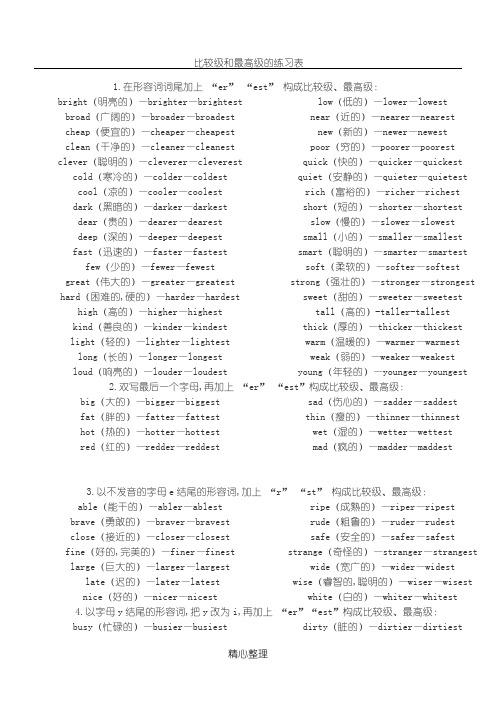
比较级和最高级的练习表1.在形容词词尾加上“er” “est” 构成比较级、最高级:bright(明亮的)—brighter—brightest broad(广阔的)—broader—broadest cheap(便宜的)—cheaper—cheapest clean(干净的)—cleaner—cleanest clever(聪明的)—cleverer—cleverest cold(寒冷的)—colder—coldestlow(低的)—lower—lowestnear(近的)—nearer—nearestnew(新的)—newer—newestpoor(穷的)—poorer—poorest quick(快的)—quicker—quickest quiet(安静的)—quieter—quietestsmarteststrongestyoungestbrave(勇敢的)—braver—bravest close(接近的)—closer—closest fine(好的,完美的)—finer—finest large(巨大的)—larger—largest late(迟的)—later—latestnice(好的)—nicer—nicestrude(粗鲁的)—ruder—rudestsafe(安全的)—safer—safest strange(奇怪的)—stranger—strangest wide(宽广的)—wider—widestwise(睿智的,聪明的)—wiser—wisest white(白的)—whiter—whitest4.以字母y结尾的形容词,把y改为i,再加上“er”“est”构成比较级、最高级:busy(忙碌的)—busier—busiest dirty(脏的)—dirtier—dirtiestdry(干燥的)—drier—driest early(早的)—earlier—earliesteasy(容易的)—easier—easiestfriendly(友好的)—friendlier—friendliest funny(好玩的)—funnier—funniesthappy(开心的)—happier—happiest healthy(健康的)—healthier—healthiest heavy(重的)—heavier—heaviestlazy(懒惰的)—lazier—laziestlucky(幸运的)—luckier—luckiest naughty(调皮的)—naughtier—naughtiest noisy(嘈杂的)—noisier—noisiest pretty(美丽的)—prettier—prettiest silly(傻的)—sillier—silliestspicy(辣的)—spicier—spiciest thirsty(渴的)—thirstier—thirstiest ugly(丑的)—uglier—ugliesttired(累的)—more tired—most tired6.不规则变化的形容词:bad(坏的)—worse—worst far(远的)—farther—farthest (far—further—furthest)good(好的)—better—bestill(病的)—worse—worst little(少的)—less—leastmany(多的)—more—mostmuch(多的)—more—most old(年老的)—older—oldest(old—elder—eldest)well(好的,身体好的)—better—best。
英语单词的比较级和最高级
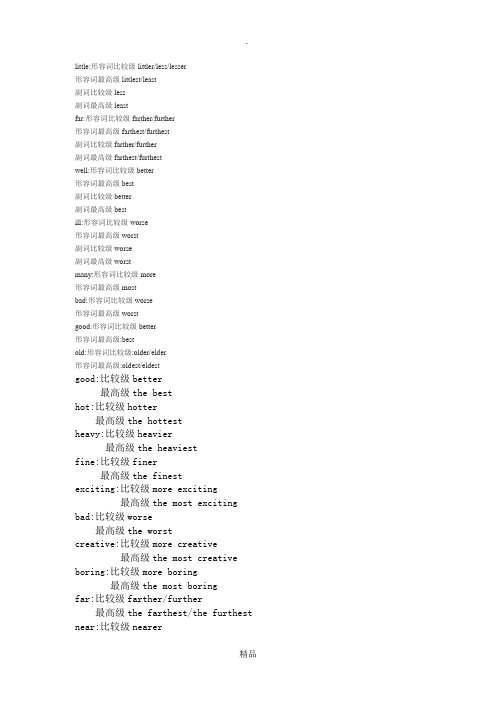
little:形容词比较级littler/less/lesser形容词最高级littlest/least副词比较级less副词最高级leastfar:形容词比较级farther/further形容词最高级farthest/furthest副词比较级farther/further副词最高级farthest/furthestwell:形容词比较级better形容词最高级best副词比较级better副词最高级bestill:形容词比较级worse形容词最高级worst副词比较级worse副词最高级worstmany:形容词比较级more形容词最高级mostbad:形容词比较级worse形容词最高级worstgood:形容词比较级better形容词最高级:bestold:形容词比较级:older/elder形容词最高级:oldest/eldestgood:比较级better最高级the besthot:比较级hotter最高级the hottestheavy:比较级heavier最高级the heaviestfine:比较级finer最高级the finestexciting:比较级more exciting最高级the most exciting bad:比较级worse最高级the worstcreative:比较级more creative最高级the most creative boring:比较级more boring最高级the most boringfar:比较级farther/further最高级the farthest/the furthest near:比较级nearer最高级the nearest如有侵权请联系告知删除,感谢你们的配合!。
中考英语常见副词形容词比较级最高级单词归纳总结

中考英语常见副词形容词比较级最高级单词归纳总结一、目录1.中考英语常见副词形容词比较级最高级单词归纳总结2.不规则变化词比较级最高级3.特殊用法比较级最高级4.常用句型总结5.易混淆词汇辨析6.语法考点解析二、中考英语常见副词形容词比较级最高级单词归纳总结1.副词比较级最高级:more,most;less,least;fairly,quite;hardly,scarcely;again,once more;fast,faster,fastest;early,earlier,earliest;high,higher,highest;late,later,latest;near,nearer,nearest等。
2.形容词比较级最高级:big,bigger,biggest;small,smaller,smallest;hot,hotter,hottest;red,redder,reddest;beautiful,more beautiful,most beautiful等。
3.不规则变化词比较级最高级:good,better,best;badly,worse,worst;many,more,most等。
4.特殊用法比较级最高级:as...as中间用形容词或副词原级;the+比较级+ofthe two/in the pair表示两者中比较...的一个;the+序数词+比较级表示第几...等。
三、常用句型总结1.The+比较级...,the+比较级...越...越...2.比较级+than+any other+单数名词/any of+复数名词/any+单数名词表示最高级的含义。
3.比较级+than+the other+单数名词/the other+复数名词表示比较级的含义。
4.比较级+than+同一主语的其他动词表示比较级的含义。
5.The+比较级+主语+谓语表示比较级的特殊用法。
四、易混淆词汇辨析1.more和many的区别:more修饰可数名词复数或不可数名词,表示更多;many修饰可数名词复数。
(完整版)比较级和最高级
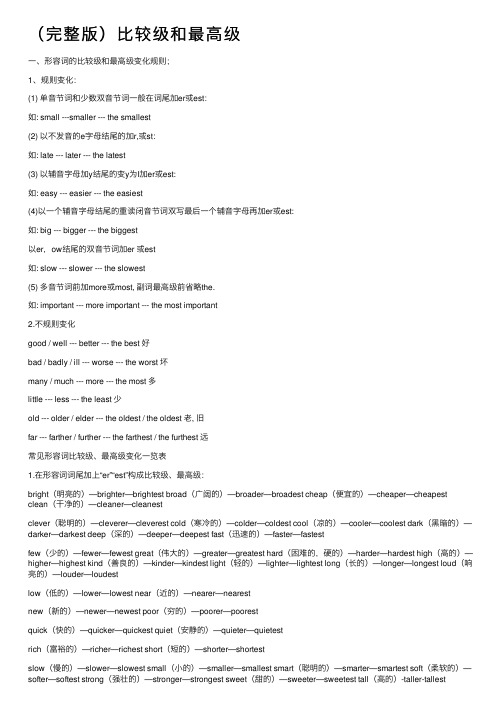
(完整版)⽐较级和最⾼级⼀、形容词的⽐较级和最⾼级变化规则;1、规则变化:(1) 单⾳节词和少数双⾳节词⼀般在词尾加er或est:如: small ---smaller --- the smallest(2) 以不发⾳的e字母结尾的加r,或st:如: late --- later --- the latest(3) 以辅⾳字母加y结尾的变y为I加er或est:如: easy --- easier --- the easiest(4)以⼀个辅⾳字母结尾的重读闭⾳节词双写最后⼀个辅⾳字母再加er或est:如: big --- bigger --- the biggest以er,ow结尾的双⾳节词加er 或est如: slow --- slower --- the slowest(5) 多⾳节词前加more或most, 副词最⾼级前省略the.如: important --- more important --- the most important2.不规则变化good / well --- better --- the best 好bad / badly / ill --- worse --- the worst 坏many / much --- more --- the most 多little --- less --- the least 少old --- older / elder --- the oldest / the oldest ⽼, 旧far --- farther / further --- the farthest / the furthest 远常见形容词⽐较级、最⾼级变化⼀览表1.在形容词词尾加上“er”“est”构成⽐较级、最⾼级:bright(明亮的)—brighter—brightest broad(⼴阔的)—broader—broadest cheap(便宜的)—cheaper—cheapest clean(⼲净的)—cleaner—cleanestclever(聪明的)—cleverer—cleverest cold(寒冷的)—colder—coldest cool(凉的)—cooler—coolest dark(⿊暗的)—darker—darkest deep(深的)—deeper—deepest fast(迅速的)—faster—fastestfew(少的)—fewer—fewest great(伟⼤的)—greater—greatest hard(困难的,硬的)—harder—hardest high(⾼的)—higher—highest kind(善良的)—kinder—kindest light(轻的)—lighter—lightest long(长的)—longer—longest loud(响亮的)—louder—loudestlow(低的)—lower—lowest near(近的)—nearer—nearestnew(新的)—newer—newest poor(穷的)—poorer—poorestquick(快的)—quicker—quickest quiet(安静的)—quieter—quietestrich(富裕的)—richer—richest short(短的)—shorter—shortestthick(厚的)—thicker—thickest warm(温暖的)—warmer—warmest weak(弱的)—weaker—weakest young(年轻的)—younger—youngest2.双写最后⼀个字母,再加上“er”“est”构成⽐较级、最⾼级:big(⼤的)—bigger—biggest fat(胖的)—fatter—fattesthot(热的)—hotter—hottest red(红的)—redder—reddestsad(伤⼼的)—sadder—saddest thin(瘦的)—thinner—thinnestwet(湿的)—wetter—wettest mad(疯的)—madder—maddest3.以不发⾳的字母e结尾的形容词,加上“r”“st”构成⽐较级、最⾼级:able(能⼲的)—abler—ablest brave(勇敢的)—braver—bravest close(接近的)—closer—closest fine(好的,完美的)—finer—finest large(巨⼤的)—larger—largest late(迟的)—later—latestnice(好的)—nicer—nicest ripe(成熟的)—riper—ripestrude(粗鲁的)—ruder—rudest safe(安全的)—safer—safest strange(奇怪的)—stranger—strangest wide(宽⼴的)—wider—widest wise(睿智的,聪明的)—wiser—wisest white(⽩的)—whiter—whitest4.以字母y结尾的形容词,把y改为i,再加上“er”“est”构成⽐较级、最⾼级:busy(忙碌的)—busier—busiest dirty(脏的)—dirtier—dirtiest dry(⼲燥的)—drier—driest early(早的)—earlier—earliest easy(容易的)—easier—easiest friendly(友好的)—friendlier—friendliest funny(好玩的)—funnier—funniest happy(开⼼的)—happier—happiest healthy(健康的)—healthier—healthiest heavy(重的)—heavier—heaviesthungry(饿的)—hungrier—hungriest lazy(懒惰的)—lazier—laziestlucky(幸运的)—luckier—luckiest naughty(调⽪的)—naughtier—naughtiest noisy(嘈杂的)—noisier—noisiestpretty(美丽的)—prettier—prettiest silly(傻的)—sillier—silliest spicy(辣的)—spicier—spiciestthirsty(渴的)—thirstier—thirstiest ugly(丑的)—uglier—ugliest4.双⾳节、多⾳节形容词,在单词前⾯加上“more”“most”构成⽐较级、最⾼级:afraid(害怕的)—more afraid—most afraidbeautiful(美丽的)—more beautiful—most beautifulcareful(仔细的)—more careful—most carefulcheerful(开⼼的)—more cheerful—most cheerfulcrowded(拥挤的)—more crowded—most crowdeddangerous(危险的)—more dangerous—most dangerousdelicious(美味的)—more delicious—most deliciousdifficult(困难的)—more difficult—most difficultexciting(令⼈兴奋的)—more exciting—most excitingexpensive(昂贵的)—more expensive—most expensivefamous(著名的)—more famous—most famousfrightened(受惊的)—more frightened—most frightenedfrightening(令⼈害怕的)—more frightening—most frighteninghard-working(勤奋的)—more hard-working—most hard-workinghonest(诚实的)—more honest—most honestimportant(重要的)—more important—most importantinteresting(有趣的)—more interesting—most interestingpolite(有礼貌的)—more polite—most politeterrible(可怕的)—more terrible—most terribletired(累的)—more tired—most tired5.不规则变化的形容词:bad(坏的)—worse—worst good(好的)—better—bestfar(远的)—farther—farthest (far—further—furthest)ill(病的)—worse—worst little(少的)—less—leastmany(多的)—more—most much(多的)—more—mostold(年⽼的)—older—oldest ( old—elder—eldest)well(好的,⾝体好的)—better—best⼀. 写出下列形容词或副词的⽐较级和最⾼级.bad ________________ ______________________________clean ________________ ______________________________ famous ______________ _______________________ dirty _________________ ______________________________big __________________ _____________________________small _________________ ______________________________heavy _____________ ______________________little __________________ ______________________________hard __________________ ______________________________ happy _______________________________________________far ___________________ ______________________________ expensive _____________________________________________________ well _________________ ______________________________easy __________________ ______________________________ wide __________________________________________________ young _________________ ________________________________ rude___________________ ________________________________ cheap __________________________________________________ ugly __________________ _________________________________ busy___________________ ________________________________ old _____________________________________________________ noisy __________________ _________________________________ interesting _____________________ _______________________________ hot _____________________________________________________ cold ___________________ _________________________________ many __________________ ________________________________ bright _________________________________________________ boring __________________ _______________________________ difficult_______________________ ________________________________ beautiful ____________________________________________________thin _____________________ _______________________________good ____________________ _______________________________strong____________________ ______________________________warm ________________ _______________________ late __________________ _______________________ weak _________________ ______________________ tall ___________________ ______________________ short __________________ ______________________ loud ___________________ ______________________ lazy ___________________ ______________________ quick __________________ ______________________ angry __________________ ______________________ clever __________________ ______________________ smart __________________ ______________________ low ____________________ __________________⼆、选择填空1. Which does Jimmy like _____ , Chinese or Art?A. wellB. bestC. betterD. much2. The Changjiang River is one of _____ in the world.A. the longest riverB. longest riversC. the longest riversD. longer rivers3. _____ of the two women is Mrs Brown.A. The beautifulB. The more beautifulC. More beautifulD. The most beautiful4. My mooncake is nicer _____ his.A. likeB. withC. forD. than5. You are fatter than _____ .B. hisC. himD. he is tall6. He jumps _____ of the three.A. farB. furtherC. farthestD. furthest7. My hair is longer than _____ .A. my sisterB. KateC. my brother’sD. Lucys’8. There are _____ paper here .Please bring some.A. littleB. lessC. fewerD. a little9. The pen is _____ than that one.A. more cheapB. cheapC. much cheaperD. quite cheaper10.Tom speaks Chinese _____ better than Jimmy.A. moreB. veryC. a lot ofD. much11.There are _____ girls in Class Two than in Class Four.A. moreB. nicestC. mostD. best12.It’s too _____ for you to do that.B. more dangerousC. harderD. the easiest13.Who has _____ apples now, Jim, Lily or Lucy?A. muchB. biggestC. betterD. the most14.You have more rulers than me. But _____ are nicer than _____ .A. mine, yoursB. mine, yourC. my, yoursD. my, your15.Tingting is _____ than Meimei, but Meimei is _____ than Tingting.A. all, strongerB. taller, strongestC. tallest, strongD. taller, stronger16.Mother is _____ in my family.A. busyB. busierC. the busiestD. more busy17.There are _____ in the park on Sunday.A. more childrenB. a lot of peopleC. much men and womenD. many peoples18.-This blue sweater is too big for me .-Will you please show me a _____ one?A. smallB. smallerC. the smallestD. smallest19.No one is _____ Mary in the class.B. as taller asC. so high asD. so tall as20. This bike is _____ than that one.A. twenty yuan dearB. twenty yuan dearerC. dear twenty yuanD. dearer twenty yuan[参考答案] CCDDA CDBCD AADAD CBBDB三、⽤所给词的适当形式填空1.Your classroom is _____ (wide) and _____ (bright) than ours.2.There are _____ (few) hours of sunlight a day in winter than in summer.3.Which do you like _____ (well) , maths or chemistry?4.This is the _____ (good) film I have ever seen.5.Africa is the second _____ (large) continent.6.What he said made his mother much _____ (angry) .7.I’m not as _____ (careful) as he.8.We’ve got as _____ (many) books as we need.9.Pratice as _____ (much) as you can.10.They have done _____ (much) work with _____ (little) money.11.You’re the _____ (kind) person I’ve ever met.12.He is _____ (young) than his two sisters.13.The _____ (old) I get, the _____ (strong) I seem to feel.14.The weather is getting _____ (warm) and _____ (warm) .15.Summer is _____ (hot) season of the year.[参考答案] 1. wider, brighter 2. fewer 3. better 4. best 5. largest 6. angry 7. careful 8. many 9. much 10. more, less 11. kindest 12. younger 13. older, stronger, 14. warmer, warmer 15. the hottest。
- 1、下载文档前请自行甄别文档内容的完整性,平台不提供额外的编辑、内容补充、找答案等附加服务。
- 2、"仅部分预览"的文档,不可在线预览部分如存在完整性等问题,可反馈申请退款(可完整预览的文档不适用该条件!)。
- 3、如文档侵犯您的权益,请联系客服反馈,我们会尽快为您处理(人工客服工作时间:9:00-18:30)。
形容词
比较级最高级young
young er young est long
long er long est short
short er short est small
small er small est old old er old est
形容词的比较级和最高级
1. 当两种物体之间相互比较时,要用比较级;
2. 但相互比较的物体是三个或三个以上,要用最高级。
3. 形容词出现比较的时候,要用比较级或者最高级,形容词要做出相应的变化,以下是变化规则: ①一般情况下,直接加 er / est 如long-longer-longest
②以e 结尾的单音节形容词,加r / st 如fine-finer-finest
③以辅音加y 结尾的形容词,改y 为i 加er / est 如esay-easier-easiest
④重读闭音节,双写最后的辅音字母,加er/est 如big-bigger-biggest
⑤多音节的形容词,在前面加more/most 如more expensive
⑥不规则变化:
以下是常出现的形容词的比较级和最高级,需背下来,可借助规则。
②以e 结尾的单音节形容词,加r / st .
①一般情况下,直接加er/est .
④重读闭音节,双写最后的辅音字母,加er/est.不规则变化,需牢记⑤多音节的形容词,在前面加more/most.③以辅音加y 结尾的形容词,改y 为i 加er . est
tall tall er tall est cheap cheap er cheap est high high er high est light light er light est hard hard er hard est fine fine r fine st late
late r late st nice nice r nice st large large r large st free free r free st wide wide r wide st stale stale r stale st
easy eas ier eas iest hungry hungr ier hungr iest early earl ier earl iest heavy heav ier heav iest healthy health ier health iest happy happ ier happ iest busy bus ier bus iest funny funn ier funn iest big big ger big gest wet wet ter wet test hot hot ter hot test
fat fat ter fat test sad sad der sad dest thin thin ner thin nest
beautiful more
beautiful
most beautiful
interesting more
interesting
most
interesting
careful more careful most careful
expensive more
expensive
most
expensive
difficult more
difficult
most difficult
important more
important
most
important
good/well better best
bad/ill worse worst many/much more most little less least。
